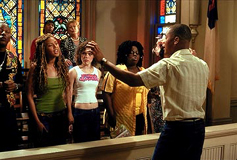|
Newest Reviews:
New Movies -
The Tunnel
V/H/S
The Tall Man
Mama Africa
Detention
Brake
Ted
Tomboy
Brownian Movement
Last Ride
[Rec]³: Genesis
Hara-Kiri: Death of a Samurai
Indie Game: The Movie
Abraham Lincoln: Vampire Hunter
Old Movies -
Touki Bouki: The Journey of the Hyena
Drums Along the Mohawk
The Chase
The Heiress
Show
People
The Strange Affair of Uncle Harry
Pitfall
Driftwood
Miracle Mile
The Great Flamarion
Dark Habits
Archives -
Recap: 2000,
2001, 2002,
2003, 2004
, 2005, 2006,
2007 , 2008
, 2009 ,
2010 , 2011 ,
2012
All reviews alphabetically
All reviews by star rating
All reviews by release year
Masterpieces
Screening Log
Links
FAQ
E-mail me
HOME
| |
The Fighting Temptations (Jonathan Lynn, 2003)
 The Fighting Temptations, the new comedy from director Jonathan Lynn (My
Cousin Vinny, Clue), might be formulaic, but it uses its formula in a way that’s
tough to deride. Consider for example, the way that the inevitability of its
plot and presence of its supporting cast pretty much steamrolls over the fact
that Cuba Gooding Jr. isn’t very good in his leading role as Darrin, an ad man
who finds himself when the death of his aunt forces him into a stint as the
director of a Georgia church choir. It’s certainly treading familiar territory
when it shows Darrin assemble his choir out of people young and old, ensuring
the film a chance to appeal to every demographic (he recruits both prisoners and
Rue McClanahan), but it allows the opportunity for a great deal of good cheer
and a few hearty chuckles. Co-star Beyonce’s presence as a lounge singer who
gets converted to Darrin’s cause makes for a predictable romantic lead (made
more auspicious by the presence of Pepsi in the background whenever she’s in
the frame), but she is charismatic enough that she doesn’t seem bothersome.
She gets a chance to sing too. Almost predictably, she belts out an
unfortunately chaste rendition of “Fever” followed by a “Swing Low Sweet
Chariot” that naughtily appeals to secular side in all of us. The plot is
essentially a reheated Sister Act with
Cuba in the Whoopi role, and as such it’s unfortunate that the revelation of
Darrin’s true intentions takes an unbearably long time to come about.
Fortunately, the movie becomes something interesting when that revelation sets
up an unexpected message scene.
The Fighting Temptations, the new comedy from director Jonathan Lynn (My
Cousin Vinny, Clue), might be formulaic, but it uses its formula in a way that’s
tough to deride. Consider for example, the way that the inevitability of its
plot and presence of its supporting cast pretty much steamrolls over the fact
that Cuba Gooding Jr. isn’t very good in his leading role as Darrin, an ad man
who finds himself when the death of his aunt forces him into a stint as the
director of a Georgia church choir. It’s certainly treading familiar territory
when it shows Darrin assemble his choir out of people young and old, ensuring
the film a chance to appeal to every demographic (he recruits both prisoners and
Rue McClanahan), but it allows the opportunity for a great deal of good cheer
and a few hearty chuckles. Co-star Beyonce’s presence as a lounge singer who
gets converted to Darrin’s cause makes for a predictable romantic lead (made
more auspicious by the presence of Pepsi in the background whenever she’s in
the frame), but she is charismatic enough that she doesn’t seem bothersome.
She gets a chance to sing too. Almost predictably, she belts out an
unfortunately chaste rendition of “Fever” followed by a “Swing Low Sweet
Chariot” that naughtily appeals to secular side in all of us. The plot is
essentially a reheated Sister Act with
Cuba in the Whoopi role, and as such it’s unfortunate that the revelation of
Darrin’s true intentions takes an unbearably long time to come about.
Fortunately, the movie becomes something interesting when that revelation sets
up an unexpected message scene.
 Early scenes in The
Fighting Temptations show the cash-strapped Darrin kissing his maxed-out
credit cards for luck before he attempts to get a cash advance at the ATM and
dodging creditors. Living in New York City, he seems to have it all, but we
learn that his lifestyle is fraudulent and spiraling out of control. The movie
even goes so far as to create a threat of creditor showing up and outing him in
front of the choir, who believe he’s a famous record producer, even though one
never actually materializes. Before his triumphant third-act return to his
choir, Darrin makes a brief trip back to the city to give a boardroom of
advertising executives a dubious PowerPoint presentation that argues that the
urban lifestyle is based on the accumulation material possessions, and therefore
bad. Similar to last year’s hit Barbershop,
there’s a conservative vibe running throughout The Fighting Temptations that seems to stand in direct opposition to
the hip-hop culture that dominates most of the portrayals of African Americans
in mainstream cinema (making the decision to cast Beyonce, who has a song
entitled “Hip-Hop Star” on her latest CD, baffling). While Fighting
is nowhere as preachy as that film was, which is surprising given the
backdrop of the church, it draws a line in the sand that separates it from most
modern Black Cinema. It’s problematic thesis, though, since the movie contains
too much fawning celebrity presence (Steve Harvey, Faith Evans essentially play
variations on their existing public personas) for a film that’s telling us our
desires to be famous are utterly misguided. Ideological confusion aside, The
Fighting Temptations manages to remain a fairly lively slice of family
entertainment throughout. The lack of gross-out moments is refreshing, as is the
way that it never sacrifices its character-driven plot to a discordant comic set
piece. Thankfully, it also manages to skip over a lot of obvious scenes of
self-realization, leaving a movie that feels more focused on entertaining than
edifying. I wasn’t exactly dancing in the aisles during The
Fighting Temptations, but at the same time, watching it didn’t feel like
atonement. Early scenes in The
Fighting Temptations show the cash-strapped Darrin kissing his maxed-out
credit cards for luck before he attempts to get a cash advance at the ATM and
dodging creditors. Living in New York City, he seems to have it all, but we
learn that his lifestyle is fraudulent and spiraling out of control. The movie
even goes so far as to create a threat of creditor showing up and outing him in
front of the choir, who believe he’s a famous record producer, even though one
never actually materializes. Before his triumphant third-act return to his
choir, Darrin makes a brief trip back to the city to give a boardroom of
advertising executives a dubious PowerPoint presentation that argues that the
urban lifestyle is based on the accumulation material possessions, and therefore
bad. Similar to last year’s hit Barbershop,
there’s a conservative vibe running throughout The Fighting Temptations that seems to stand in direct opposition to
the hip-hop culture that dominates most of the portrayals of African Americans
in mainstream cinema (making the decision to cast Beyonce, who has a song
entitled “Hip-Hop Star” on her latest CD, baffling). While Fighting
is nowhere as preachy as that film was, which is surprising given the
backdrop of the church, it draws a line in the sand that separates it from most
modern Black Cinema. It’s problematic thesis, though, since the movie contains
too much fawning celebrity presence (Steve Harvey, Faith Evans essentially play
variations on their existing public personas) for a film that’s telling us our
desires to be famous are utterly misguided. Ideological confusion aside, The
Fighting Temptations manages to remain a fairly lively slice of family
entertainment throughout. The lack of gross-out moments is refreshing, as is the
way that it never sacrifices its character-driven plot to a discordant comic set
piece. Thankfully, it also manages to skip over a lot of obvious scenes of
self-realization, leaving a movie that feels more focused on entertaining than
edifying. I wasn’t exactly dancing in the aisles during The
Fighting Temptations, but at the same time, watching it didn’t feel like
atonement.
49
09-22-03
Jeremy Heilman
|